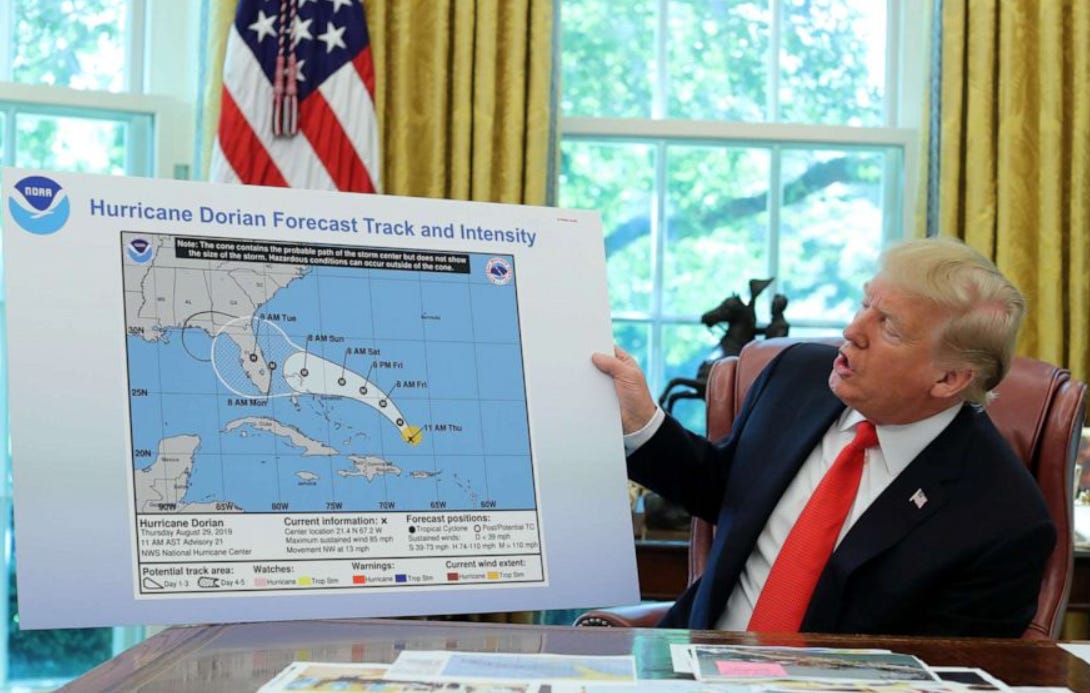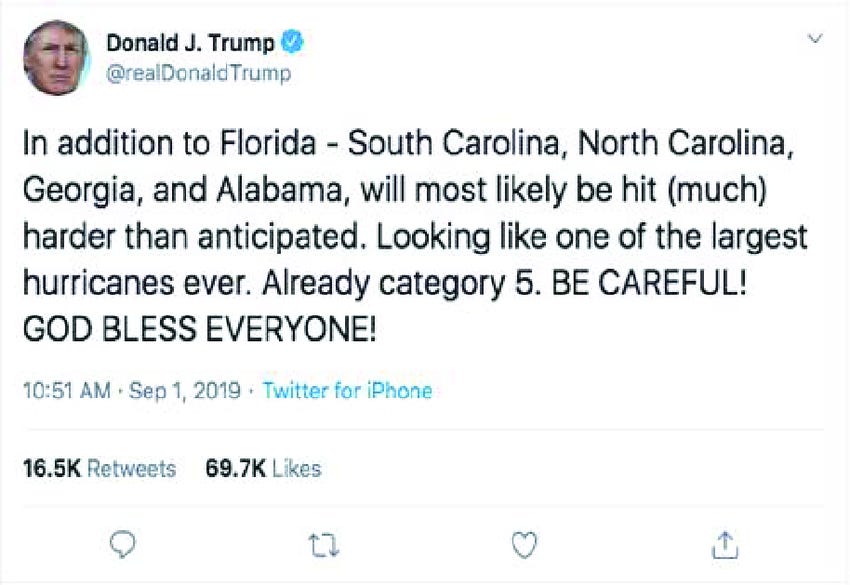Dudes vs. Ideas: Why Personality-Based Movements are Doomed
Or why error-correction is the highest human virtue
Trump is undeniably one of the greatest meme makers alive. His output is so prolific that it’s really easy for some of his masterpieces to be drowned out. I want to revisit a particularly illustrative episode that happened five years ago — that one time Trump drew on a hurricane map with a marker.
A brief recap of the events is helpful here. On September 1st, 2019, Hurricane Dorian hit the Bahamas, causing widespread destruction, killing at least 74 people, and displacing tens of thousands. The storm was expected to continue towards Florida, prompting mass evacuations from several states. President Donald Trump dutifully warned Americans of the potential impact in a tweet on 10:51 AM EST, and curiously included Alabama as one of the states that would get affected.
But by the time he tweeted this out, the National Hurricane Center had already issued several forecast updates that showed the storm steering very far away from Alabama, instead turning north up the Atlantic Coast. The latest one was Intermediate Advisory 32A, issued almost three hours before his tweet, at 8 AM:
About 20 minutes after his Alabama tweet, the National Weather Service’s station in Birmingham issued a statement, corroborating that the storm was going to be too far east to impact Alabama. The most plausible explanation for why Trump would make a mistake like this is that he misread Bahamas as Alabama. Trump has really bad eyesight but refuses to wear glasses, and instead compensates by writing notes in a very large font:
It was an innocuous mistake to make, rendered further inconsequential by a very quick correction. No big deal, right? Perhaps it should have been no biggie, but Trump refused to admit error and he instead doubled down. Five days later, NOAA issued an unsigned statement that criticized the Birmingham NWS station for speaking “in absolute terms that were inconsistent with probabilities from the best forecast products available at the time.” They also corroborated Trump’s claim that Alabama “could” have been impacted by linking to wind speed probability forecast advisories #15 to #41, with #26 showing the peak of the potential impact:
The most generosity you could provide this position is at that at some point, some forecasts predicted that some parts of Alabama had up to a 30% chance of experiencing wind speeds that were at least 39 mph or more. Note that as a category 5 storm, Hurricane Dorian reached record-breaking 185 mph wind speeds.
It’s important to stress that this fracas has real life consequences. Although nominally part of the government, public institutions like a national weather service wield no meaningful authority in practice. They have no dudes with guns that can beat people into following their directives — their power lies entirely in the willingness of the public to voluntarily follow their advice. I’ve previously excoriated public health authorities for frivolously immolating their credibility by issuing blatantly arbitrary directives during the pandemic and, for the same reasons, NWS would be rightfully ignored if they cry evacuation wolf too often. As Dan Sobien, the head of the NWS labor union said at the time:
It is absolutely necessary that the National Weather Service maintains its authority and people believe our warnings. And it’s absolutely necessary, once they hear our warnings, that they hear them over and over. Whatever it takes. There’s absolutely no reason, in 2019, that anybody has to die because of a hurricane, at least in the United States.
The coup de grâce for all of this is of course was on September 4th, when Trump presented forecast Advisory #21 (from August 29th) with sharpie sloppily drawn on that included parts of Alabama, claiming this was “the original chart”. Obviously reporters asked him about the black marker alteration:
Reporter: “That map that you showed us today, looked like it almost had, like, a Sharpie written on—”
Trump: “I don't know. I don't know. I don't know.”
You don’t need a mindreading device to conclude that Trump got caught making a mistake, instead of admitting error he tasked a subordinate to conjure up an explanation to cover up that he made a mistake, and when further cornered on it he plead ignorance. Sound familiar?
So why bring all this up again? I mean, it’s really funny! But also because it perfectly illustrates a stark difference in ideology between lower-case liberalism, which thrives on transparency and correction, and whatever Trump represents. I’ve repeatedly outlined that the fundamental flaw with MAGA is its inability (refusal?) to embrace error-correcting mechanisms.
Consistent with my brand though, I want to first steelman the case for 1) lying 2) brazenly 3) about inconsequential shit, because there is one!
Let’s go through them in order of difficulty. Typical justifiable scenario for lying is of the “Gestapo at your door and Anne Frank in your attic” genre. Easy. Doing so brazenly gets points in a range of scenarios — maybe you want to pump up someone’s confidence by lying about how they’re totally going to crush their interview (spoiler: they were not, but now they might), or maybe you need to bluff your way through a threat by pretending you’re better equipped than you are.
Lying about inconsequential shit is much harder to justify. The less it matters, the more it can be argued that the lie spares people unnecessary angst — such a fib about having already eaten so you don’t offend by turning down food. Generally though, those who insist on devoting energy towards defending inconsequential lies tend to do so with ulterior motives.
Authoritarians and cult leaders are particularly prone to deploying trivial lies as a way to flex control. It’s funny when dictators fabricate election results and don’t even bother making up something plausible. Just try and challenge the 96% voting results while everyone else around you is dutifully nodding along like a good boy. The blizzard of inconsequential falsehoods also blurs what’s real and what’s fabricated, ultimately leaving only the leader’s word as the buoy gospel.
The common theme here are arenas where belief in the leader’s superhumanity is paramount to the social order. Cults cannot function without an unyielding belief in the leader’s infallibility. Dictatorships unravel if their blanket control is outed as a fiction. What is anathema, absolutely inviolable in all these situations is for the charade to be shattered, for the central character to ever admit error.
As a method of social control, it’s unmatched in its ability to stir up zealotry. Sure, you could, in theory, use this fervor to push people beyond their limits, but this setup is tailor-made — and most easily exploited — to advance a single person’s interests. That’s why so many similar movements incessantly repeat how the central leader is irreplaceable. Cults frequently talk about prophets or the chosen one, and dictatorships frequently have grand myths about the central person. It’s not the particular biblical interpretation that matters, but whatever allows David Koresh to fuck all his followers’ wives. Dictatorships don’t sell the public on specific policy preferences; but whatever hagiography presents Dear Leader as the only one who can save us from [insert crisis].
In the same way, it’s not any specific conservative principles (besides anti-immigration, do these even exist today?) that will save us, but Trump specifically. It’s not really Ideas that are pushed forward, but Dudes; and movements built around Dudes — trou du cul in French — are cul-de-sacs with no future. They’re both mortal after all.
Maybe the human behavior I’m autistically most puzzled by is the reluctance to admit error. I used to think it was just the predictable (but misguided) outcome of the constant need to protect one’s image — ‘if I admit I’m wrong now, then everyone might wonder where else I was wrong, and then they’ll never trust me and then aaahhhh’. But I happen to think very highly of myself (you would too if you had all my talents 😘) and yet, I experience absolutely no hesitation or friction in transparently admitting error including on some very fundamental beliefs. True to my word, one of the greenest flags I look for regarding any writer or commentators credibility is their ability to admit error and reparably introspect.
The better explanation is a fundamental difference in framing. When your faith is rooted in Dudes, when your gurgling source of truth depends on one guy’s word, then you naturally grow protective and defensive of that particular person’s scrying ability. In contrast, if you place your faith in Ideas, they’re plentiful and disposable — bad ones can be tossed aside without hesitation. Besides, if the idea was bad, it says nothing about you personally.
I know some bona fide Trump supporters are masochistic enough to read my shit, so let me make one qualifier very clear: none of the above criticism applies to you if you can articulate specific policies and are agnostic about how those come to pass. And I would love to hear those specifics! But, if you’re attached to Trump qua Trump, maybe ask yourself why you consider him so vital, and whether that’s a healthy attachment. I would love to hear about that as well.







Hmm, let's play a devil's argument here.
Both Christianity and Islam lean heavily on personalities of their founders and they seem to be far from moribund, even though both dudes are long dead.
I mostly just want a presidential candidate with a 101 level understanding of basic economics, and while Trump absolutely isn't it, Harris's economic agenda...um...doesn't exactly inspire confidence in her either.